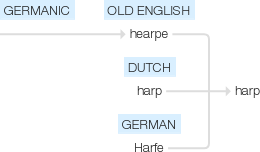Harp
Old English hearpe, of Germanic origin; related to Dutch harp and German Harfe .
wiktionary
From Middle English harpe, from Old English hearpe(“harp”), from Proto-West Germanic *harpā, from Proto-Germanic *harpǭ(“harp”). Cognate with Scots hairp(“harp”), West Frisian harpe, harp(“harp”), Low German Harp(“harp”), Dutch harp(“harp”), German Harfe(“harp”), Danish harpe(“harp”), Swedish harpa(“harp”).
etymonline
harp (n.)
Old English hearpe "harp, stringed musical instrument played with the fingers," from Proto-Germanic *harpon- (source also of Old Saxon harpa "instrument of torture;" Old Norse harpa, Dutch harp, Old High German harpfa, German Harfe "harp") of uncertain origin. Late Latin harpa, source of words in some Romanic languages (Italian arpa, Spanish arpa, French harpe), is a borrowing from Germanic. Meaning "harmonica" is from 1887, short for mouth-harp. The harp seal (1784) is so called for the harp-shaped markings on its back.
harp (v.)
Old English hearpian "to play on a harp;" see harp (n.). Cognate with Middle Dutch, Dutch harpen, Middle High German harpfen, German harfen. Figurative sense of "talk overmuch" (about something), "dwell exclusively on one subject" first recorded mid-15c. Related: Harped; harping.
